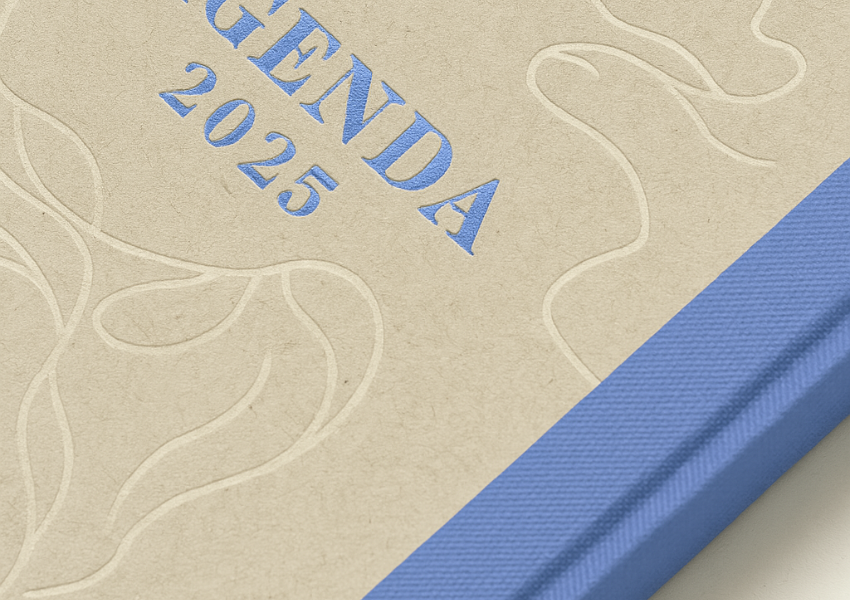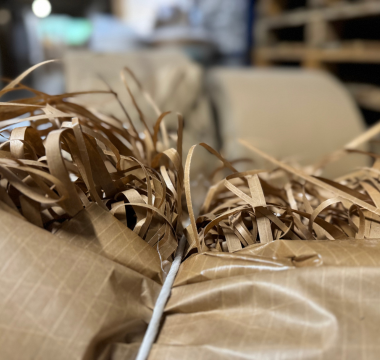Crepe Paper: Technical Functionality in School Binding
Crepe paper is a versatile material made from cellulosic fibers that undergo a creping process to create a wrinkled structure, enhancing its mechanical properties. In the production of notebooks and planners, it is mainly used as a technical support at various stages of assembly and finishing, providing strength, adaptability, and structural control.
Its purpose goes beyond aesthetics: it directly contributes to the quality and longevity of the final product, making it a widely used material by printing houses, industrial bookbinders, and school supply manufacturers.
Main Applications of Crepe Paper in Notebooks and Planners
Spine Reinforcement
One of the most common uses of crepe paper in this sector is reinforcing the spine during the binding process. Thanks to its crosswise elasticity, it adapts to the opening and closing movements of the notebook or planner without tearing, maintaining the integrity of the inner block even after heavy use.
Taping and Sewing of Notebooks
In sewn bindings, crepe paper is used as a support strip that helps join the sheets to the spine, ensuring proper attachment without limiting flexibility. Its texture allows for effective adhesion with hot-melt or cold glues, without deforming or excessively absorbing the adhesive.
Layer Separation and Finishing
During the production of notebooks and planners with hard or laminated covers, crepe paper can serve as an intermediate layer that absorbs stress, preventing deformation of the final material. It is also used as a technical separator in lamination or die-cutting lines.
Advantages of Crepe Paper Over Other Supports
Crepe paper offers specific advantages compared to alternative materials such as textile gauze, standard kraft paper, or synthetic tapes:
- Greater adaptability to deformation: its wrinkled structure allows movement without tearing.
- Strong longitudinal and transverse resistance: it remains stable even under continuous handling.
- Compatibility with industrial processes: it works perfectly in automated binding, cutting, and gluing lines.
- Available in various grammages and widths: at Arrosi, we manufacture it in reels and formats tailored to each production line.
These features make it especially useful for large-scale production of school notebooks and planners, where technical efficiency must not compromise aesthetics or durability.
Seasonality and Crepe Paper in Back-to-School Campaigns
August marks the peak season for school supply production and distribution in Europe. In this context, crepe paper becomes a strategic resource for manufacturers needing to prepare high volumes of notebooks and planners, planners, journals, and logbooks with tight delivery deadlines.
Thanks to its shelf stability, ease of handling, and technical versatility, crepe paper is ideal for integration into fast-paced processes without sacrificing quality control.
Arrosi´s Crepe Paper: Technical Assurance for Binding
At Arrosi, we manufacture crepe paper specifically for the graphic and bookbinding industries, with the following features:
- Grammages ranging from 40 g/m² to 90 g/m², depending on the application (reinforcement, sewing, separation).
- Customizable widths for production lines—from narrow formats to wide reels.
- Controlled creping to ensure elongation suited to mechanical movement without tearing.
- High tear and tensile strength, both wet and dry.
- Available in white, brown, or custom colors, tailored to end-user needs.
In addition, our technical team supports each manufacturer in selecting the most suitable crepe paper, providing samples and specific recommendations to maximize efficiency during peak seasons.
Sustainability and Crepe Paper in the Publishing Industry
One of the most valued aspects during back-to-school season is the sustainability of school materials. Since crepe paper is made from cellulosic fibers, it is biodegradable and recyclable, meeting circular economy standards.
At Arrosi, we are committed to responsible production, using certified raw materials and optimizing processes to minimize the environmental impact of each meter of paper produced.
Crepe Paper at Arrosi
Incorporating crepe paper into the production of notebooks and planners represents a significant technical improvement. It strengthens the product’s structure, ensures its durability, and supports high-volume manufacturing. As we approach the 2025/2026 academic year, this material proves to be a key ally for manufacturers focused on quality, functionality, and sustainability.
At Arrosi, we bring our expertise and production capabilities to the service of the graphic industry, developing customized crepe paper solutions for every bookbinding need.




